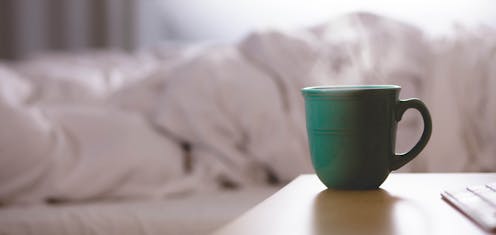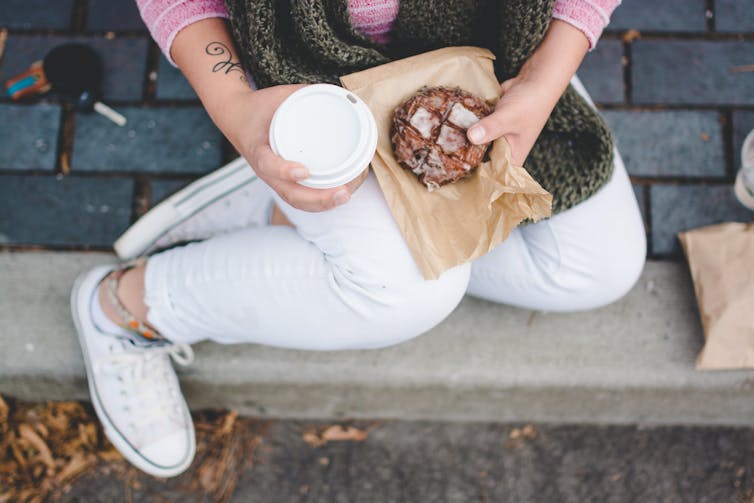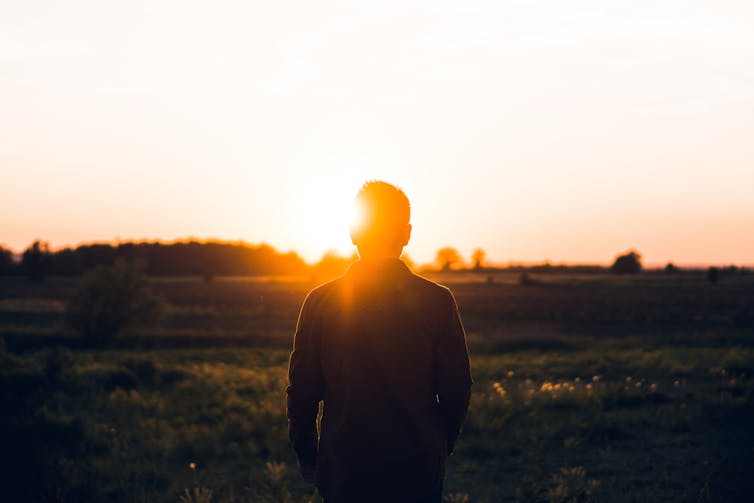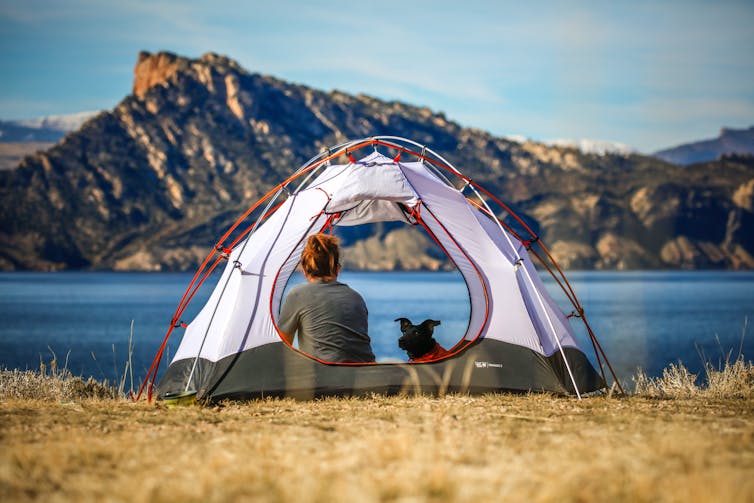Why getting enough sleep should be on your list of New Year's resolutions
- Written by Amy Reynolds, Lecturer in Psychology, CQUniversity Australia
 Getting enough sleep can help our memory, waistline and our performance at work.David Mao
Getting enough sleep can help our memory, waistline and our performance at work.David MaoIf you need an alarm to get up in the morning, you’re probably not getting enough sleep.
More than 40% of Australians get too little sleep to feel rested and able to function at their best. The average amount for an adult is around seven hours, while only 8% are lucky enough to get more than nine hours. Some 12% of Australians get less than 5.5 hours, and three-quarters of those struggle to get through their day.
These holidays, ditch the alarm clock and make getting enough sleep one of your New Year’s resolutions. Your memory, waistline and even your employer may thank you for it.
Why getting enough sleep should be a priority
Our brains use sleep time to sort through our experiences. We “clean up” and get rid of information connections we don’t need from the day just gone. Without adequate sleep, we may not be making enough space for new learning and memories.
Read more: Why our brain needs sleep and what happens if we don’t get it
Getting enough sleep also ensures we are safe to drive on the roads and less likely to make costly mistakes at work and home. Being awake for longer than 17 hours impairs your ability to think clearly as much as having a blood alcohol concentration above 0.05. After 24 hours awake, your ability to perform cognitive tasks is as poor as if you had a blood alcohol concentration of 0.10.
Last year’s Australian sleep survey found 29% of Australian workers reported making errors at work in the previous three months specifically because they hadn’t got enough sleep. One in five respondents reported having nodded off while driving.
Getting enough sleep may also be helpful for managing our food intake. When people are only allowed to sleep for short periods of time, they are more likely to choose to snack food, particularly sweet snacks.
 It’s natural to reach for sweet snacks when we don’t get enough sleep.Sarah Swinton
It’s natural to reach for sweet snacks when we don’t get enough sleep.Sarah SwintonThe body’s response to eating food changes when sleep is restricted; as little as one week of restricted sleep is associated with glucose (sugar) levels approaching pre-diabetic levels.
The benefit is not limited to individual well-being. Australian workers who feel they get inadequate sleep are more likely to take a sick day than those who feel they get enough.
So, how much sleep do we need?
The American Sleep Foundation recommends adults aged between 18 and 64 get between seven and nine hours of sleep a night, while older adults should aim for seven to eight hours.
Read more – Explainer: how much sleep do we need?
Your ideal sleep duration will be unique to you and fall somewhere within the recommended range. To find out how much sleep you need, try a week-long experiment and modified sleep regime. Think of it as your holiday homework:
Cut back on how much you are doing during the week, particularly in the evening, to give yourself time to wind down
Put away the technology. A tech ban in the bedroom might be the best start
Create a dark sleeping space
Get rid of the alarm clock so your body has the chance to tell you how much sleep you need
Keep a week-long diary of your sleep times and daytime energy levels to get a feel for how much sleep feels good the next day.
 Over a week, see how much sleep you actually need to feel fresh.Warren Wong
Over a week, see how much sleep you actually need to feel fresh.Warren WongYou might find you need to sleep longer than usual for the first couple of nights. But remember, this is an exercise to work out how sleep can help you feel good rather than a test to see how much sleep you “must” or “can” get as this pressure may not help with sleeping well.
You might feel a little groggy the next morning which is normal, but you should wake up – and get up – when you feel well-rested.
Further reading – Health Check: how can I make it easier to wake up in the morning
By seeing where you sit on the sleep spectrum, you can work out the bed and wake times that best suit your needs.
How to get more sleep
Here are some starting points to make sleep more of a priority.
1) Reduce your exposure to bright lights in the evening
Allowing your body to naturally respond to the light and dark cycle each day can lead to earlier bed times.
Ditching distractors that delay our bedtimes can help shift the increase in the hormone melatonin, which makes us sleepy, to earlier in the evening.
As little as one weekend of camping away from electrical lighting, including blue light in our devices, can help us become early risers.
 Camping is a good way to reset the body clock.Patrick Hendry
Camping is a good way to reset the body clock.Patrick HendryIf there’s no time for camping this Christmas, try a “camp at home” approach by reducing your light exposure throughout the house at night; dim and fewer lights in the evening is ideal.
2) Establish a routine
While some find falling asleep a breeze, this can be a slow process for many. Consistent activities – such as brushing your teeth, reading a book – at a regular time each evening can help your body recognise and prepare for heading to bed.
Read more – Health Check: how to soothe yourself to sleep
Make sure this time is in addition to the time you set aside for sleep, so you have enough time to wind down before bed.
This routine extends to consistent wake times. A regular bed and wake time schedule should be complimentary.
3) Talk to your doctor about your sleep
If you’re told you snore, or you never feel refreshed even after what seems to be a long sleep, talk to your GP about whether you might have an underlying disorder that makes getting enough sleep harder.
According to last year’s national sleep survey, 8% of Australians have diagnosed sleep apnoea, 18% have restless leg syndrome and 20% have insomnia. Getting help for these conditions will impact your physical and mental health.
While time spent sleeping may feel akin to “doing nothing” for your health, the benefits of regular, refreshing sleep for your brain and body mean that it should be on your New Year’s resolution list right next to healthy eating and exercise.
Amy Reynolds has received funding from the Freemason's Foundation (Trevor Prescott Memorial Scholarship) and the Australasian Sleep Association (Helen Bearpark Memorial Scholarship and Rob Pierce Grant in Aide). She is a current member (and committee member) of the Australasian Sleep Association, and is a member of the Sleep Health Foundation. She has a non-financial research relationship with microbial genomics company uBiome.
Doug McEvoy receives funding from the National Health and Medical Research Council and Philips Respironics
Robert Adams receives funding from the National Health and Medical Research Council, The Hospital Research Foundation and the ResMed Foundation.
Sally Ferguson receives funding from the Australia Research Council through her institution. She has a non-financial research relationship with microbial genomics company uBiome.
Authors: Amy Reynolds, Lecturer in Psychology, CQUniversity Australia





